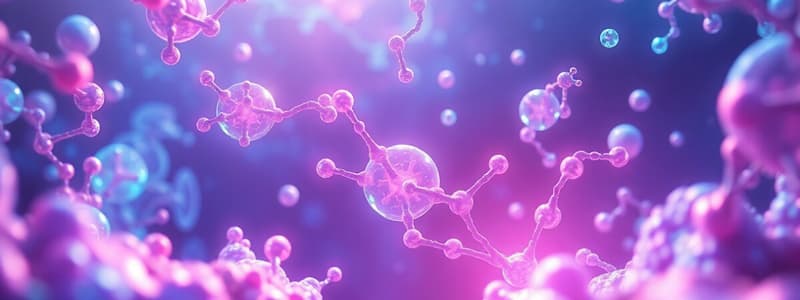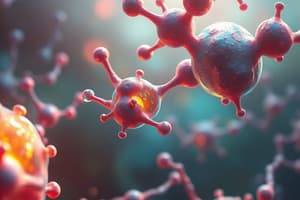Podcast
Questions and Answers
What is the primary function of proteins in biochemistry?
What is the primary function of proteins in biochemistry?
- Enzyme function and structural support (correct)
- Genetic information storage
- Fat storage
- Energy storage
Which process involves the breakdown of molecules to obtain energy?
Which process involves the breakdown of molecules to obtain energy?
- Replication
- Catabolism (correct)
- Anabolism
- Synthesis
What role do enzymes play in biochemical reactions?
What role do enzymes play in biochemical reactions?
- They serve as nutrients.
- They act as catalysts to accelerate reactions. (correct)
- They synthesize carbohydrates.
- They store genetic information.
What technique is used to analyze proteins and nucleic acids by their size and charge?
What technique is used to analyze proteins and nucleic acids by their size and charge?
In biochemistry, what is primarily investigated within cellular signaling?
In biochemistry, what is primarily investigated within cellular signaling?
Flashcards are hidden until you start studying
Study Notes
Definition
- Biochemistry is the branch of science that explores the chemical processes within and related to living organisms.
Key Areas of Study
-
Macromolecules:
- Carbohydrates: sugars and starches, energy storage and structure.
- Proteins: made of amino acids, function as enzymes, structural components, and signaling molecules.
- Lipids: fats, oils, and membranes, involved in energy storage and cellular structures.
- Nucleic Acids: DNA and RNA, essential for genetic information storage and transmission.
-
Metabolism:
- Catabolism: breakdown of molecules to obtain energy.
- Anabolism: synthesis of compounds needed for cellular structure and function.
-
Enzyme Function:
- Catalysts that speed up biochemical reactions.
- Specificity, active sites, and influence of temperature/pH on activity.
-
Cellular Signaling:
- Mechanisms by which cells communicate and respond to environmental changes.
- Role of hormones, receptors, and second messengers.
-
Genetic Information:
- Structure and function of DNA and RNA.
- Processes of transcription and translation in protein synthesis.
Techniques and Methods
- Chromatography: separation of mixtures based on component properties.
- Electrophoresis: technique for analyzing proteins and nucleic acids by size and charge.
- Spectroscopy: analyzing molecules based on light absorption/emission.
Importance
- Understanding diseases at a molecular level (e.g., diabetes, cancer).
- Development of pharmaceuticals and biotechnology.
- Insights into metabolic pathways and their regulation.
Applications
- Medicine: drug design, genetic testing.
- Agriculture: genetically modified organisms (GMOs) for crop improvement.
- Environmental science: bioremediation, understanding ecological dynamics.
Biochemistry: The Science of Life's Chemistry
- Biochemistry is the study of chemical processes within, and related to, living organisms.
- It encompasses a vast array of topics, including macromolecules, metabolism, enzyme function, cellular signaling, and genetic information.
Macromolecules: The Building Blocks of Life
- Carbohydrates are sugars and starches crucial for energy storage and structural support.
- Proteins are made of amino acids and serve as enzymes, structural components, and signaling molecules.
- Lipids, encompassing fats and oils, are vital for energy storage and forming cellular structures, including membranes.
- Nucleic acids, such as DNA and RNA, are essential for storing and transmitting genetic information.
Metabolism: The Flow of Energy in Living Systems
- Catabolism involves the breakdown of molecules to release energy.
- Anabolism refers to the synthesis of compounds needed for cellular structure and function.
Enzymes: Catalysts of Life's Reactions
- Enzymes are biological catalysts that accelerate biochemical reactions.
- They exhibit specificity, binding to specific molecules at their active sites.
- Enzyme activity is influenced by factors like temperature and pH.
Cellular Signaling: Communication Within and Between Cells
- Cells communicate and respond to environmental changes through complex signaling mechanisms.
- This involves hormones, receptors, and second messengers.
Genetic Information: The Blueprint of Life
- DNA and RNA are the primary carriers of genetic information.
- Transcription and translation are crucial processes for protein synthesis.
Techniques and Methods in Biochemistry
- Chromatography separates mixtures based on the properties of their components.
- Electrophoresis analyzes proteins and nucleic acids by size and charge.
- Spectroscopy analyzes molecules based on their light absorption or emission.
The Significance of Biochemistry
- It provides insights into diseases at a molecular level, leading to better diagnoses and treatments.
- Biochemistry drives the development of pharmaceuticals and biotechnology.
- It elucidates metabolic pathways and their regulation, crucial for understanding health and disease.
Applications of Biochemistry
- Medicine relies on biochemistry for drug design and genetic testing.
- Agriculture leverages biochemistry through genetically modified organisms (GMOs) to enhance crop yields and quality.
- Environmental science utilizes biochemistry for bioremediation and understanding ecological dynamics.
Studying That Suits You
Use AI to generate personalized quizzes and flashcards to suit your learning preferences.




